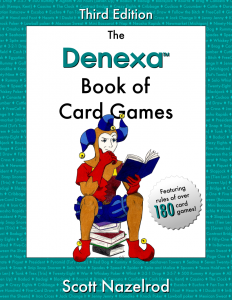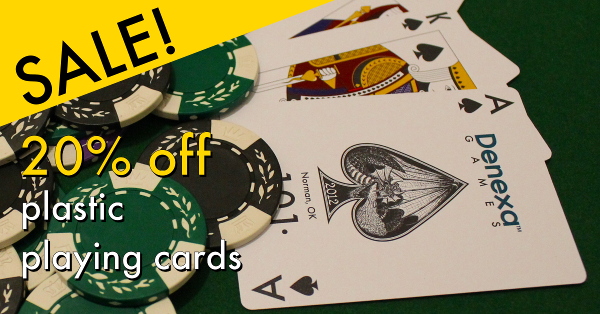Umtali
Umtali is a rummy game for two players. Unlike most rummy games, which only allow sets or sequences of three or more cards, Umtali includes those melds, as well as marriages, and even single cards and pairs under certain circumstances! The result is a fascinating rummy game with lots of melding opportunities. That also means it’s a quick game—expert players can play a hand in five minutes!
Umtali’s heyday is said to have been during the days of colonial Rhodesia (now Zimbabwe). Indeed, the name Umtali is the former name of what’s now called Mutare, the fourth-largest city in Zimbabwe. Umtali was a popular pastime among train passengers in Rhodesia; its quick play time and the limited play space required make it a great travel game. Nevertheless, by the late 1970s the game had mostly died out in Africa.
Object of Umtali
The object of Umtali is to score more points than your opponent over the course of four hands. Players score points by forming their hand into melds.
Setup
To play Umtali, you need a standard 52-card deck of playing cards. Keep your game protected from drink spills and damage by using a deck of Denexa 100% Plastic Playing Cards. You’ll also need something to keep score with, like pencil and paper or a smartphone app.
Shuffle and deal ten cards to each player. Place the deck stub in the center of the table, forming the stock. Turn up the top card of the stock and place it next to it. This card becomes the first card of the discard pile. Note that the stock and discard pile divide the play area into two halves; the side nearest each player will be where they play their melds.
Game play
The non-dealer plays first. As in most rummy games, a player always starts their turn by drawing, then melding if possible, and finally discarding.
A player begins their turn by drawing a card. They may either draw the top card of the stock, or the top card of the discard player. If the player draws from the discard pile, and they are immediately able to meld the card they drew, they may then also take the next card of the discard pile if they can immediately play it too.
Melding
After drawing, a player can meld as many cards as they wish. There are three basic types of melds in Umtali. The first is the set or group, which consists of three or four cards of the same rank, other than jacks. Second is the sequence, which consists of three or more consecutive number cards of the same suit (for example, 5-6-7♥). Aces are always low, ranking below the 2, in sequences. The third is the marriage, which consists of the king and queen of the same suit (e.g. K-Q♣).
Whenever a player wishes to play one of these melds, they place the cards in a vertical, overlapping column, face up, on their side of the play area.
Single-card melds
Once a set or sequence has been laid down, it can be extended by either player. For example, the 5-6-7♥ sequence can be extended by adding the 4♥ or 8♥, or a 2♦-2♥-2♣ set extended with the 2♠. However, the extending card is not added in with the existing meld. Instead, the player extending the meld states their intention to do so (e.g. “extending your heart sequence with the 4♥”), and places it on their own side of the table as a new, single-card meld. Single-card melds can in turn be extended the same way, with other cards of the same rank, or a card of the same suit one rank above or below it.
If a player holds a set of cards that form a valid basic meld (a set, sequence, or marriage), it must always be played as such. A player cannot break it up and play it as several single-card melds.
Melding jacks
Special rules apply for melding jacks. Jacks cannot form part of a set or sequence. Instead, they must be melded individually, as single-card melds. Single-card 10s or queens may then be played from them.
Going out
A player has gone out when they have melded all of the cards in their hand. On the turn that a player goes out, they may meld one pair (the only time this is a valid meld). A player may discard when going out, but they are not required to. If they do discard, they may choose to turn their discard face down.
The opponent then gets one further turn to try to go out as well. If the player went out with a face-down discard, the opponent must draw from the stock. They then meld as many cards as possible, with pairs being treated like two-card sets for the purposes of extensions. The opponent also has the opportunity to meld a pair, if this would result in them going out. After allowing a discard, any remaining cards the opponent is unable to meld are then added to the side of the player who went out, as single-card melds.
Each player then scores the value of all of the cards on their side of the play area. Face cards and 10s score five points, and all other cards score one point. Marriages count double (i.e. they score 20 points each, rather than 5 for the king and 5 for the queen).
Whichever player has the highest score at the end of four hands wins the game.


